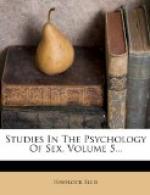“There is almost no feature, article of dress, attitude, act,” Stanley Hall declares, “or even animal or perhaps object in nature, that may not have to some morbid soul specialized erogenic and erethic power."[6] Even a mere shadow may become a fetich. Goron tells of a merchant in Paris—a man with a reputation for ability, happily married and the father of a family, altogether irreproachable in his private life—who was returning home one evening after a game of billiards with a friend, when, on chancing to raise his eyes, he saw against a lighted window the shadow of a woman changing her chemise. He fell in love with that shadow and returned to the spot every evening for many months to gaze at the window. Yet—and herein lies the fetichism—he made no attempt to see the woman or to find out who she was; the shadow sufficed; he had no need of the realty.[7] It is even possible to have a negative fetich, the absence of some character being alone demanded, and the case has been recorded in Chicago of an American gentleman of average intelligence, education, and good habits who, having as a boy cherished a pure affection for a girl whose leg had been amputated, throughout life was relatively impotent with normal women, but experienced passion and affection for women who had lost a leg; he was found by his wife to be in extensive correspondence with one-legged women all over the country, expending no little money on the purchase of artificial legs for his various protegees.[8]
It is important to remember, however, that while erotic symbolism becomes fantastic and abnormal in its extreme manifestations, it is in its essence absolutely normal. It is only in the very grossest forms of sexual desire that it is altogether absent. Stendhal described the mental side of the process of tumescence as a crystallization, a process whereby certain features of the beloved person present points around which the emotions held in solution in the lover’s mind may concentrate and deposit themselves in dazzling brilliance. This process inevitably tends to take place around all those features and objects associated with the beloved person which have most deeply impressed




